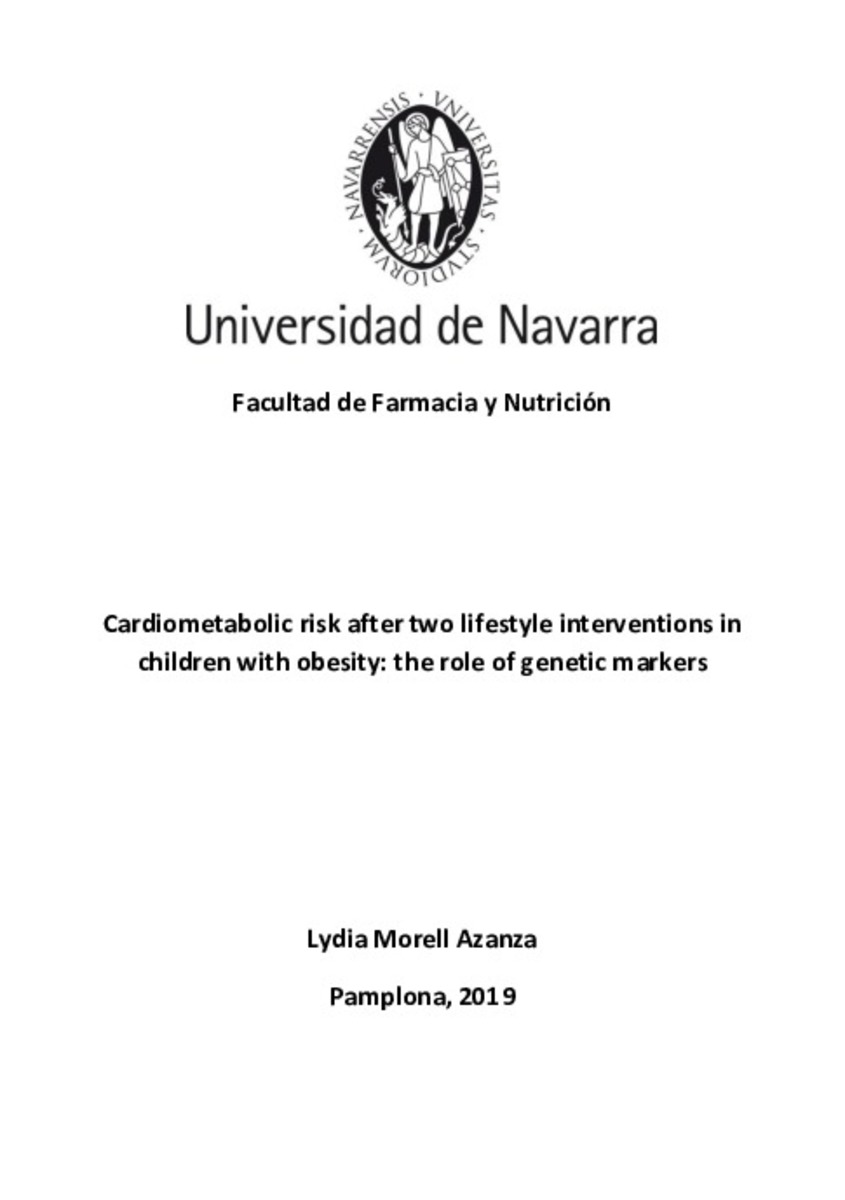Full metadata record
| DC Field | Value | Language |
|---|---|---|
| dc.contributor.advisor | Marti-del-Moral, A. (Amelia) | - |
| dc.contributor.advisor | Azcona-San-Julian, M.C. (María Cristina) | - |
| dc.creator | Morell-Azanza, L. (Lydia) | - |
| dc.date.accessioned | 2019-07-15T09:24:23Z | - |
| dc.date.available | 2019-07-15T09:24:23Z | - |
| dc.date.issued | 2019-07-15 | - |
| dc.date.submitted | 2019-06-07 | - |
| dc.identifier.citation | MORELL AZANZA, Lydia. “Cardiometabolic risk after two lifestyle interventions in children with obesity: the role of genetic markers”. Martí, A. y Azcona, M. C. (dirs.). Tesis doctoral. Universidad de Navarra, Pamplona, 2019. | es_ES |
| dc.identifier.uri | https://hdl.handle.net/10171/57999 | - |
| dc.description.abstract | Childhood obesity has increased in recent years. In Spain about one in four children are overweight or obese, and most of them will carry this status into adulthood. Health consequences derived from obesity are numerous and complex, but the most frequent are those related to cardiometabolic risk and the future development of type 2 diabetes mellitus and cardiovascular disease. Different strategies have been proposed to reduce adiposity and improve metabolic outcomes in children with obesity. Lifestyle interventions that combined dietary, physical activity and behavioural approaches with family involvement appear to be the best options to prevent weight regain. Since, obesity development stands from the interplay between lifestyle and genetic factors it is important to understand how genetic markers could influence the weight loss response. Thus, the general objective of the present project is to evaluate the effect of two lifestyle interventions on cardiometabolic risk in children with obesity. The role of genetic markers in the individual response to the intervention will also be evaluated. This thesis project includes two different lifestyle programs: 1) the NUGENOI study based on a dietary intensive intervention (10 weeks), and 2) the IGENOI study, an integral intervention with a 2-year duration (2 months + 22 months of follow up). Both lifestyle interventions were able to reduce adiposity and improve metabolic outcomes. Parameters related to cardiometabolic risk such as inflammatory cytokines and oxidized LDL cholesterol were also diminished in children with obesity. In addition, changes in glucose metabolism derived from the lifestyle intervention were associated with cardiotrophin-1 gene expression at baseline. The integral intervention of IGENOI study includes the promotion of physical activity in children. Concerning this, children with abdominal obesity from the intensive care group were more physically active (+5.5 minutes of daily increase in moderate-to-vigorous physical activity assessed by accelerometry) and lowered their cardiometabolic risk after the intervention. In fact, favorable changes in MVPA were related to changes in leptin levels. Telomere length is influenced by oxidative stress and inflammatory status, these two processes are present in obese subjects. We observed inverse associations between telomere length and adiposity indices. Moreover, baseline telomere length seemed to be a marker of changes in glucose levels. Moreover, no change in TL was observed, despite achieving a successful decrease in BMI-SDS after the integral lifestyle intervention. Finally, IGENOI participants were screened for functional mutations in Melanocortin 4 Receptor (MC4R) and Lipocalin 2 (LCN2) genes. The prevalence for the two gene variants were 2.42% and 0.84% for MC4R and LCN2, respectively. These genetic variants seem to partially explain eating behaviours. Nevertheless, subjects with those functional mutations were able to decrease adiposity after our integral lifestyle intervention. In summary, lifestyle interventions conducted in children with obesity were effective in the reduction of adiposity and metabolic outcomes. It appears that telomere length and cardiotrophin-1 gene expression could have a predictive role in glucose metabolism outcomes. Meanwhile, MC4R and LCN2 mutations could influence eating behaviours but did not change the weight loss response. | es_ES |
| dc.language.iso | eng | es_ES |
| dc.rights | info:eu-repo/semantics/openAccess | * |
| dc.subject | Materias Investigacion::Ciencias de la Salud::Nutrición y dietética | es_ES |
| dc.subject | Fisiología humana | es_ES |
| dc.subject | Genética | es_ES |
| dc.title | Cardiometabolic risk after two lifestyle interventions in children with obesity: the role of genetic markers | es_ES |
| dc.type | info:eu-repo/semantics/doctoralThesis | es_ES |
Files in This Item:
Statistics and impact
Items in Dadun are protected by copyright, with all rights reserved, unless otherwise indicated.






